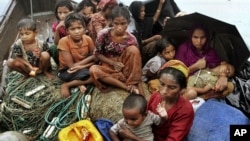Burmese opposition leader Aung San Suu Kyi voiced concern about violence in the north and west of Burma Saturday, saying despite a cease-fire with the government, hostilities among some ethnic groups continue.
She noted that "communal violence resulting in arson and murder" are occurring in western Burma, where state media say some 50 people have died in fighting between ethnic Rakhine Buddhists and ethnic Rohingya Muslims over the past few weeks.
Officials say tens of thousands of people have been displaced and more than 2,500 homes burned in Rakhine state.
On Friday the U.N. refugee agency urged neighboring Bangladesh to open its borders to refugees from the violence.
In a statement, the agency said those trying to escape are not able to find the "safety and security they desperately need."
The U.N. agency also said it has first-hand, credible accounts of boats from Burma not being allowed to access Bangladesh territory. It said women, children and wounded people are among those on the boats.
Earlier this week, officials in predominantly Muslim Bangladesh said their border guards turned back hundreds of Rohingya Muslims trying to flee the fighting. Bangladesh's Foreign Ministry said it is not in the country's best interest to let them in.
Violence erupted June 3 when a mob of Buddhists in Rakhine ambushed a bus and killed 10 Rohingya Muslim passengers, in apparent retaliation for the earlier rape and murder of a Buddhist woman by three Muslims.
She noted that "communal violence resulting in arson and murder" are occurring in western Burma, where state media say some 50 people have died in fighting between ethnic Rakhine Buddhists and ethnic Rohingya Muslims over the past few weeks.
Officials say tens of thousands of people have been displaced and more than 2,500 homes burned in Rakhine state.
On Friday the U.N. refugee agency urged neighboring Bangladesh to open its borders to refugees from the violence.
In a statement, the agency said those trying to escape are not able to find the "safety and security they desperately need."
The U.N. agency also said it has first-hand, credible accounts of boats from Burma not being allowed to access Bangladesh territory. It said women, children and wounded people are among those on the boats.
Earlier this week, officials in predominantly Muslim Bangladesh said their border guards turned back hundreds of Rohingya Muslims trying to flee the fighting. Bangladesh's Foreign Ministry said it is not in the country's best interest to let them in.
Violence erupted June 3 when a mob of Buddhists in Rakhine ambushed a bus and killed 10 Rohingya Muslim passengers, in apparent retaliation for the earlier rape and murder of a Buddhist woman by three Muslims.
Some information for this report was provided by AP, AFP and Reuters.





